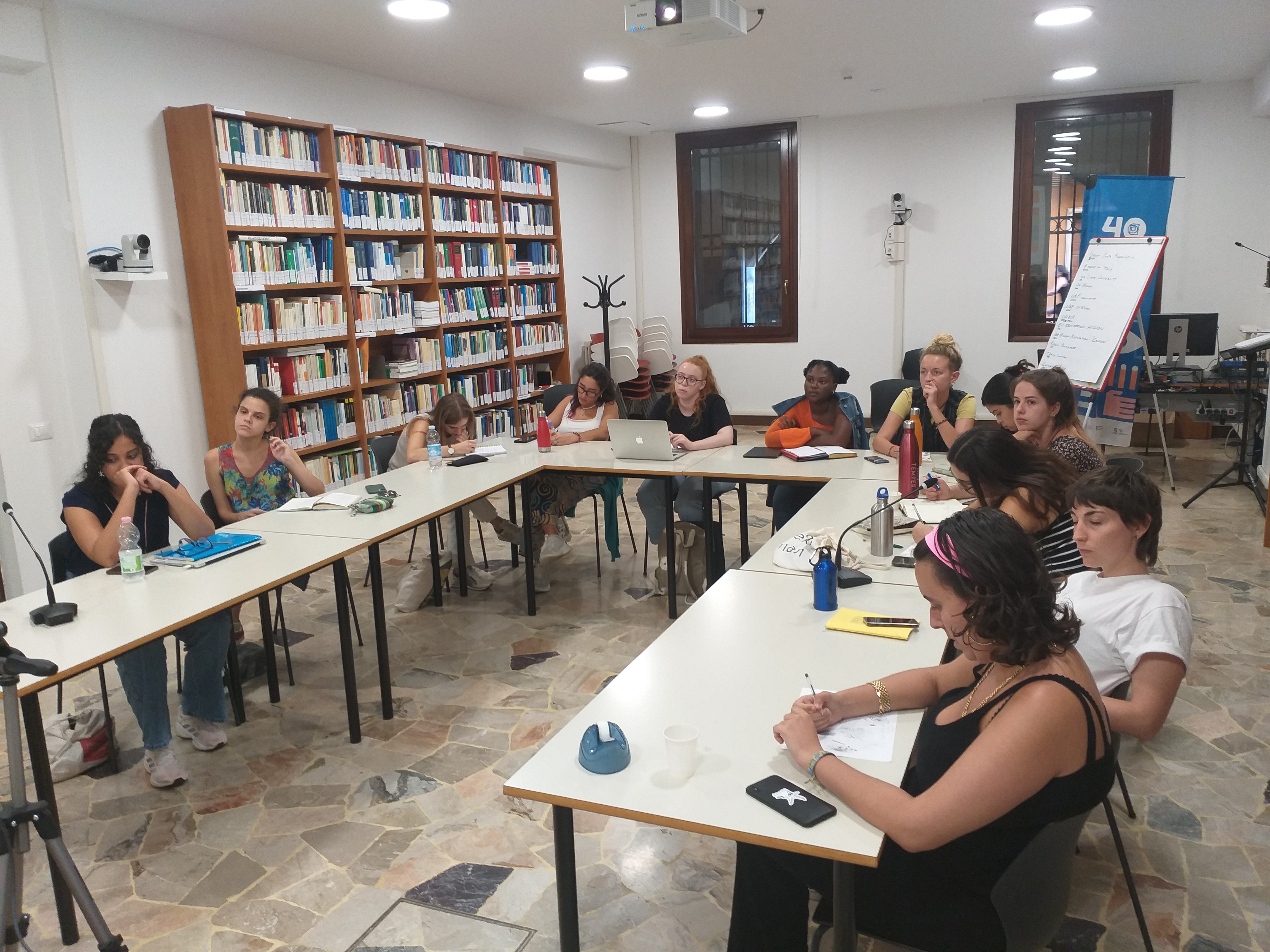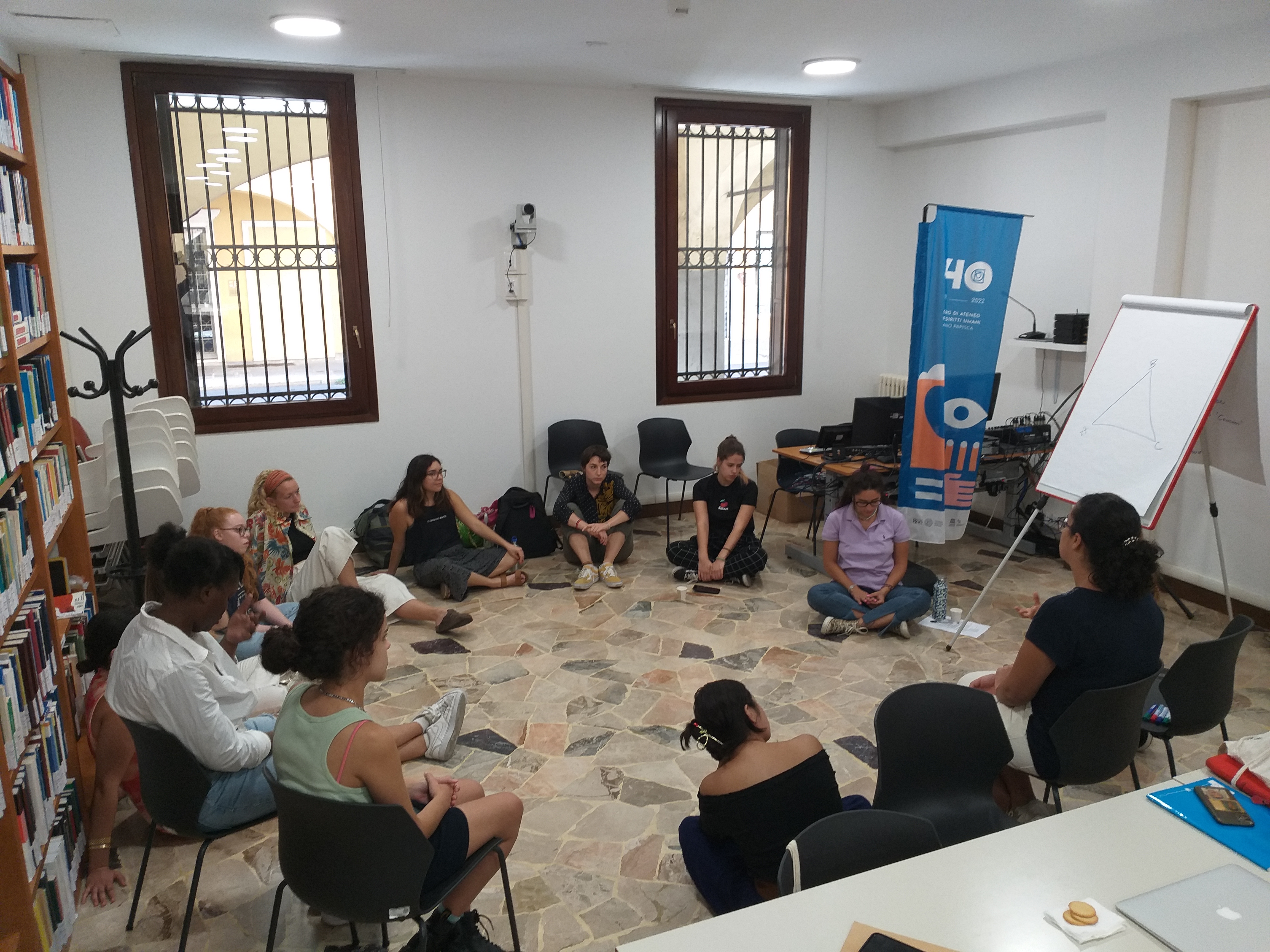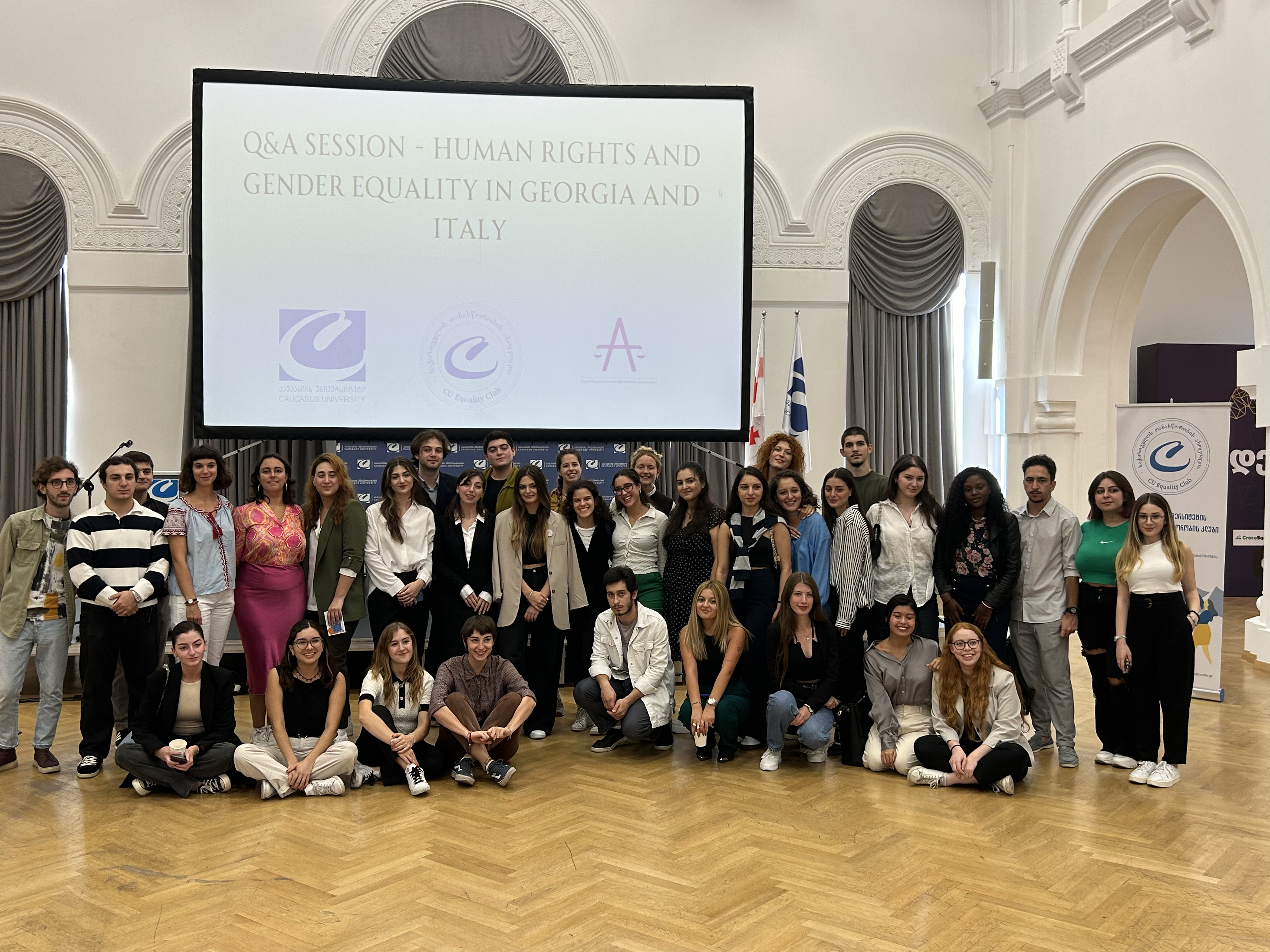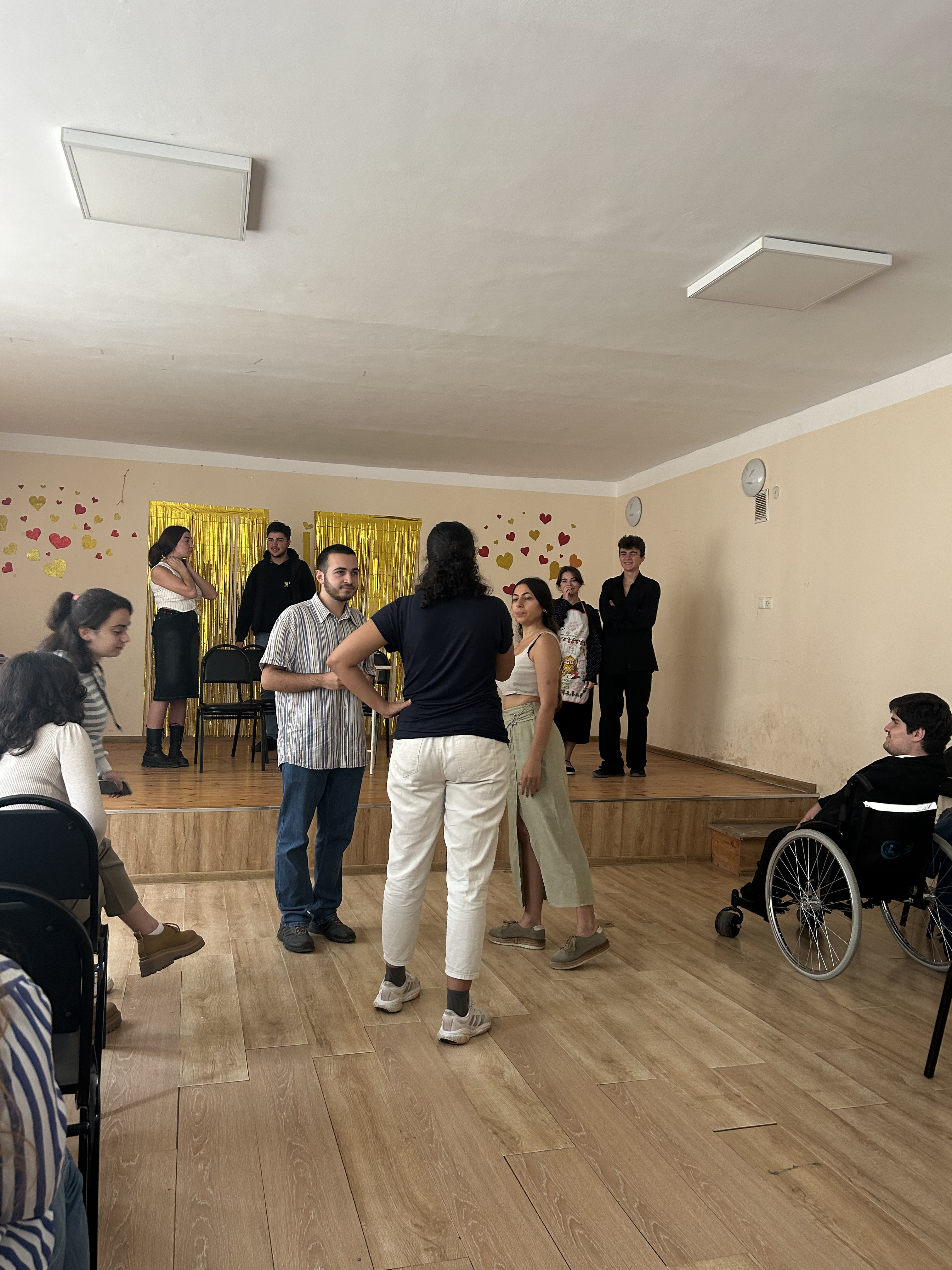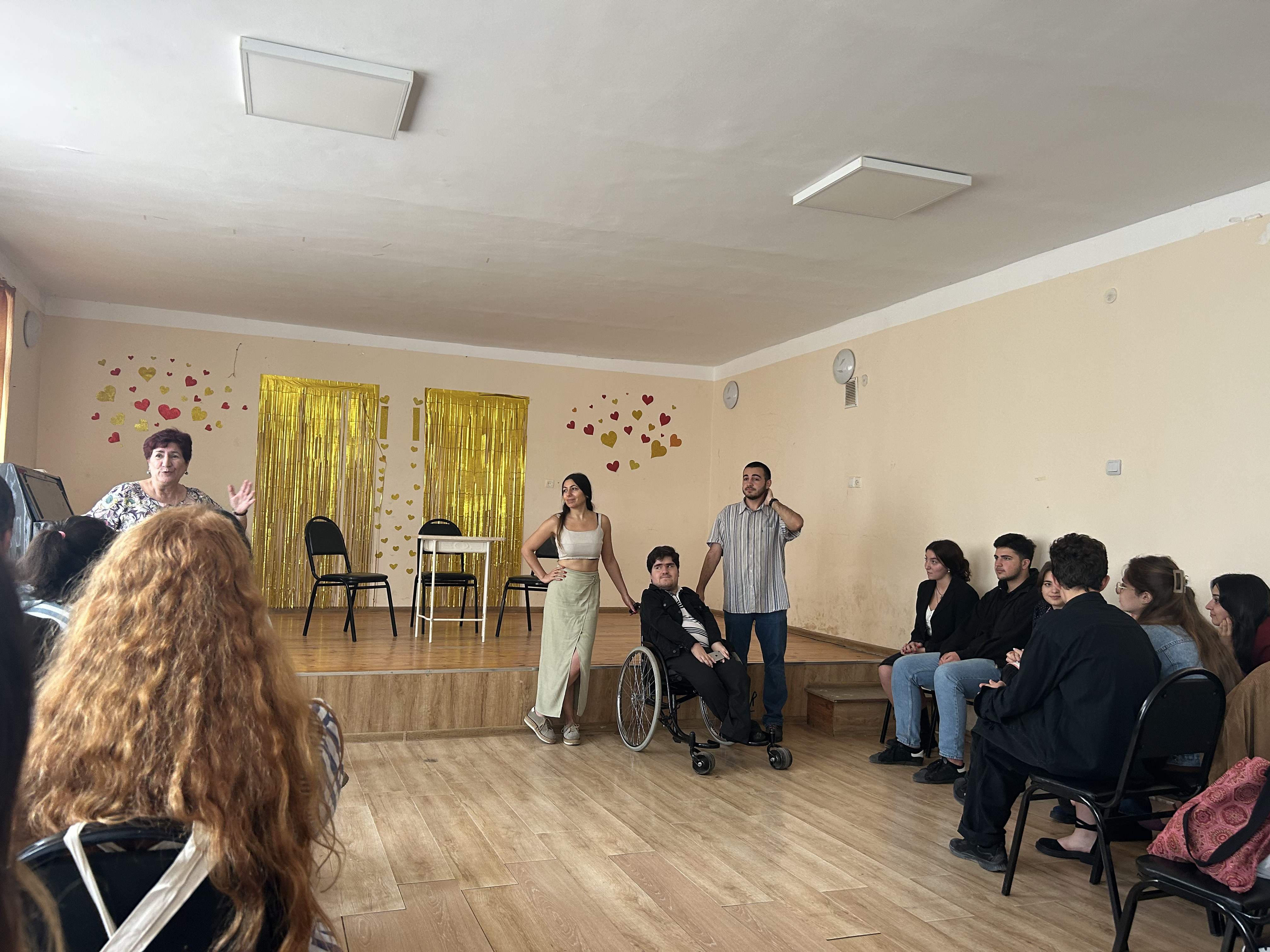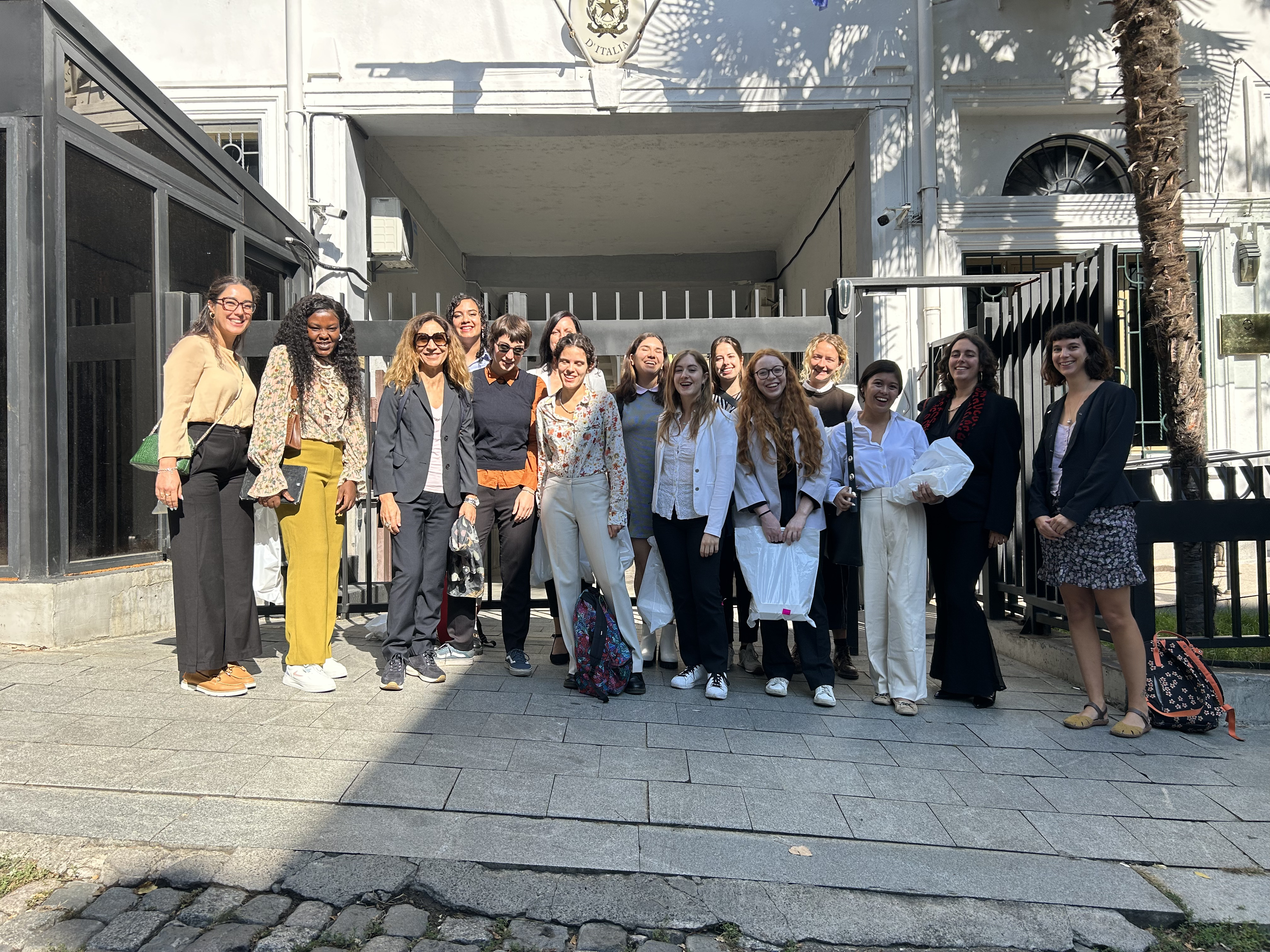Transforming the future: Georgia study trip, 16-24 September 2023

Transforming the future: young people, women and students in dialogue for peace and the protection of girls in Italy and Georgia
The study trip to Georgia, which took place from 16 to 24 September 2023 and was attended by 12 students from the Human Rights and Multi-level Governance degree of the University of Padova, has come to an end.
The initiative, realised in the framework of the project Transforming the future: young people, women and students in dialogue for peace and the protection of girls in Italy and Georgia, was an opportunity to learn about the concrete application in the Georgian reality of the International Agenda "Women, Peace and Security" - created in 2000 with the historic resolution 1325 of the United Nations Security Council - and the corresponding Agenda "Youth Peace and Security" - developed in 2015 with resolution 2250 - which recognise the positive contribution of women and youth to peace processes. In this perspective, women no longer appear as 'victims' of conflicts and women/youth as a 'threat' to security, but as valuable agents of change.
The study trip was therefore an opportunity for direct experience, exchange of good practices and in-depth study thanks to the numerous meetings with local institutions, representatives of international agencies, students, and civil society organisations committed to peacebuilding with a gender perspective in Georgia. The group participated in seminars, training sessions, institutional meetings, as well as listened to several testimonies and interacted peer-to-peer.
The study tour was promoted and organised by the Human Rights Centre "Antonio Papisca" and the UNESCO Chair "Human Rights, Democracy and Peace" of the University of Padova and the Civilian Defence Research Centre (Rome), with the support of the Ministry of Foreign Affairs and International Cooperation (MAECI) in the framework of the implementation of the 4th National Action Plan (NAP) on "Women, Peace and Security". The initiative was held in cooperation with local partners Droni Youth Association and IDP Women Association Consent.
Sunday 17th
The first meeting was with Miko, a coordinator at the DRONI Youth association, who gave the students a tour of Tbilisi. Droni is based in Tbilisi, Georgia, and is run by local and international volunteers, and they collaborate with erasmus+ to enlarge their network. With a focus on the educational and youth development programs, the organisation aims to support the young people’s physical, spiritual and educational development and to create educational initiatives in the fields of civil society, conflict resolution, human rights and peace-building. Throughout the tour not only did the students have a chance to get to know the city, but to get an idea of how daily life is for young people there. Miko gave an overview of the aspirations and challenges that young people face in Georgia.
Monday 18th
The meeting with the Embassy of Italy in Tbilisi was the first institutional meeting of the trip. Ambassador Enrico Valvo and his deputy Fabiola Albanese gave a speech concerning the political and economical relations of Italy and Georgia, vis-a-vis the tensions felt within the country and with Russia regarding the two breakaway regions of Abkhazia and South Ossetia. The Ambassador was available to answer all the questions, which ranged from economic relations between Italy and Georgia, Italian investment and presence in Georgia, to the diplomatic issues emerging from the conflict. Another topic of discussion was the application and enforcement of the Women, Peace, Security (WPS) Agenda in Georgia.
The group then met with Cuacasian House, a cultural, educational, and peacebuilding organisation. The meeting consisted of a presentation on the history of the conflict, its impact on the question of territorial sovereignty in the separatist regions of Abkhazia and South Ossetia, its geopolitical implications on security, and the prospect of peace dialogues in the South Caucasus. The representative of the organisation, Ivane Abramashvili, also touched matters concerning the perception of conflict in the national discourse and the challenges faced by organisations such as Caucasian House, where the aim is to bridge the gap between the two populations and to create spaces for dialogue in the spirit of building lasting and sustainable peace. Additionally, the group discussed limitations on the implication of women, not only in the process of peacebuilding but in peacemaking as well; it appears that despite governmental initiatives in this regard, a plethora of socio-cultural challenges still stand in the way of adopting a gender-based approach to conflict resolution in the country.
In the afternoon the group attended a lecture with Lika Jalagania, Gender Advisor at the Georgian Foundation for Strategic and International Studies and Gender and Social Inclusion Specialist at UNDP Georgia. The lecture covered the Georgian context from the perspective of NGOs, and Jalagania also relayed her personal experiences from working on the field. Georgia, on paper, has many initiatives towards the realisation of human rights, especially those of women and girls. Despite these efforts, however, there are many challenges, due to lack of political will and participation, victim-blaming culture, taboo on sexuality, and lack of protective and preventive measures. Recent moves by the government also sparked concern for political freedom with the Foreign Agents draft law, which had the potential to restrict and discredit independent and critical members of civil society. The debate between the student and Ms Jalagania focused on the importance of political will and participation not only of civil society organisations, but the ordinary citizenry as well. Had it not been for intense public backlash against the passage of the Foreign Agents law, it is highly possible that dissent and political expression would have become much more repressed, making it difficult for civil society to function properly.
Tuesday 19th
On Tuesday 19 September 2023, Maia Avaliani, met with the students of the University of Padova. Maia Avaliani, UN Women National Consultant in Georgia, has been involved in the drafting of the Georgian National Action Plans on Women, Peace and Security since its first implementation in 2011. Avaliani highlighted the importance of UNSC Resolution 1325, which affirms the crucial role of women in the prevention and resolution of conflicts, peace negotiations, peacebuilding, peacekeeping, humanitarian planning, and post-conflict reconstruction. The United Nations WPS Agenda is a trailblazing example of how women’s leadership can be incorporated into all aspects and stages of conflict.
The afternoon followed on focusing on the Georgian NAP, with a meeting with Maka Peradze and Eliso Shonia, respectively Head and Deputy Head of the Human Rights Secretariat. The Human Rights Secretariat, part of the Administration of the Government of Georgia, plays a pivotal role in coordinating the executive branch's efforts in shaping and executing human rights policies. The two gave detailed information on mechanisms for human rights protection and gender equality policy coordination. They also talked about the Second National Strategy for Human Rights, the Implementation of the UN Security Council Resolutions 2022-2024 on Women, Peace and Security, and “National Action Plans for Combating Violence against Women and to Protect Victims in 2022-2024.
The final meeting of the day was with UN Women Georgia. UN women first started working in Georgia in 2001 with a project relating to women and conflict prevention and peace-building in the Southern Caucasus. Gender played a key role in informal dialogue between communities affected by the conflict. Following the 2008 Russo-Georgian war, gender became even more relevant: gender gaps in humanitarian settings were tackled using information of a needs assessment of women affected by the conflict.
Wednesday 20th
During the morning the student delegation was welcomed by Kemlin Furley, Head of UNHCR Georgia, in the Agency's Headquarters. The role of UNHCR in Georgia is to support and assist the Government in improving the quality of the refugee status determination procedure, promoting amendments to further align the legislation governing refugee/stateless issues with international standards and to monitor the implementation of the country’s international responsibilities relating to the protection of refugees and stateless individuals. Ms Furley gave an overview of the refugee situation in Georgia, especially after the war in Ukraine, as the majority of refugees currently residing in Georgia, numbering 22,647 out of a total of 23,428 refugees as of mid-2022, are of Ukrainian origin.
Afterwards, the group of students met with their peers within the premises of Caucasian University, where they were involved in debate on issues, perceptions and aspirations of young people in Georgia. The georgian group belonged to the student association Georgian Association For Equality (GAFE) and they debated on different themes relevant for youth: sexual harassment, inclusion, european values and identity, and LGBT+ rights. Afterwards the groups shared snacks from the respective countries.
Thursday 21th
On Thursday the group took a field trip to Gori, a bordertown with the breakaway region of South Ossetia. The first meeting of the day was with the European Union Monitoring Mission in Georgia. Following the six point agreement between Russia and Georgia of October 2008, which ended the so called August war, the European Union has deployed an unarmed monitoring mission (EUMM). Its aim is that of guaranteeing the respect of the previously mentioned accords. The Monitors are deployed in 3 fields: Gori, Mtskheta and Zugdidi, as well as at the mission HQ in Tbilisi. Furthermore, there are two staff members in Brussels. Its mandate has some main elements, which are: Stabilisation, Borderization, Normalisation, Confidence Building. The mission also focuses on mainstreaming human rights, doing advocacy and cooperating with civil society organisations. When it comes to the consideration of gender, there is a gender action plan which focuses on: gender mainstreaming, data collection, gender analysis, gender focal point network, staff capacity on gender and Women, Peace and Security, gender-responsive reporting, safe and inclusive work environment.
The students were hosted in the Gori office of IDP Women Association “Consent” for a delicious typical lunch . The association Consent was founded in 1996 by women from the Internally Displaced Peoples’ community. Consent works towards the achievement of a more democratic and peaceful society, with equal opportunities for IDPs, and with a particular emphasis on women and other minority groups. After lunch, Iulia Kharashvili, Chairperson of “Consent”, took the group to the Ergneti, a village on the border. The first stop was the war museum of Ergneti. Here Lia, a local woman, installed the museum in the basement of her home, only a few metres from the Administrative Boundary Line. The museum showed big boards with photos taken during and in the first aftermath of the 2008 conflict with Russia, while Lia told the students historical facts and personal stories that occurred during those difficult times.
Afterwards, the students joined a group of children from the Consent association to have snacks, talk about their lives and play games together. In the end the students wrote down phrases and greetings in all the different languages spoken by the group on a big paper sheet, for the children to have as a memory of the day.
The last stop of the day was the museum of Stalin in Gori. The memorial museum was opened in 1937, during Stalin’s lifetime. The rooms inside are very pompous and richly decorated. Stalin’s life is explained, as well as all his exploits and precious gifts received from influential friends all over the word.
Friday 22nd
On Friday the students met with Meri Kochlamazashvili, Senior Adviser On Human Rights Issues in Conflict Affected Regions of the Public Defender Ombudsman Office. The Public Defender (Ombudsman) in Georgia monitors and ensures the protection and promotion of human rights and freedoms within the country, provides guidance to the government regarding human rights issues and conducts assessments of the country's laws, policies, and practices to ensure they align with international standards. The department related to human rights in Conflict Affected Regions carries out interviews and surveys in the border communities and provides aid and support to people living in the breakaway regions.
Saturday 23rd
As a final activity, the group went to the city of Kazreti in order to meet with the Forum Theatre Youth Group “Start Now”. Forum Theatre is a form of art that seeks to be a tool of expression for social groups, more particularly vulnerable ones, and it is the best-known technique of the “Theater of the Oppressed”. The group “Start Now” consisted of teenagers from different ethnic backgrounds aged fourteen to seventeen who presented different scenes. The performance by Forum Theater groups consists of a short sketch of about five minutes in which a situation of oppression occurs. The choice of the theme, according to the group, should always try to portray an issue that is present in the place where they are going to perform as well as for the actors because the public experience and interaction with the actors are crucial elements of this art form. Moreover, after the scene is presented for the first time a member of the audience gets to volunteer to switch places with either the “victim” or a “neutral character” in order to try and solve the presented issue.







